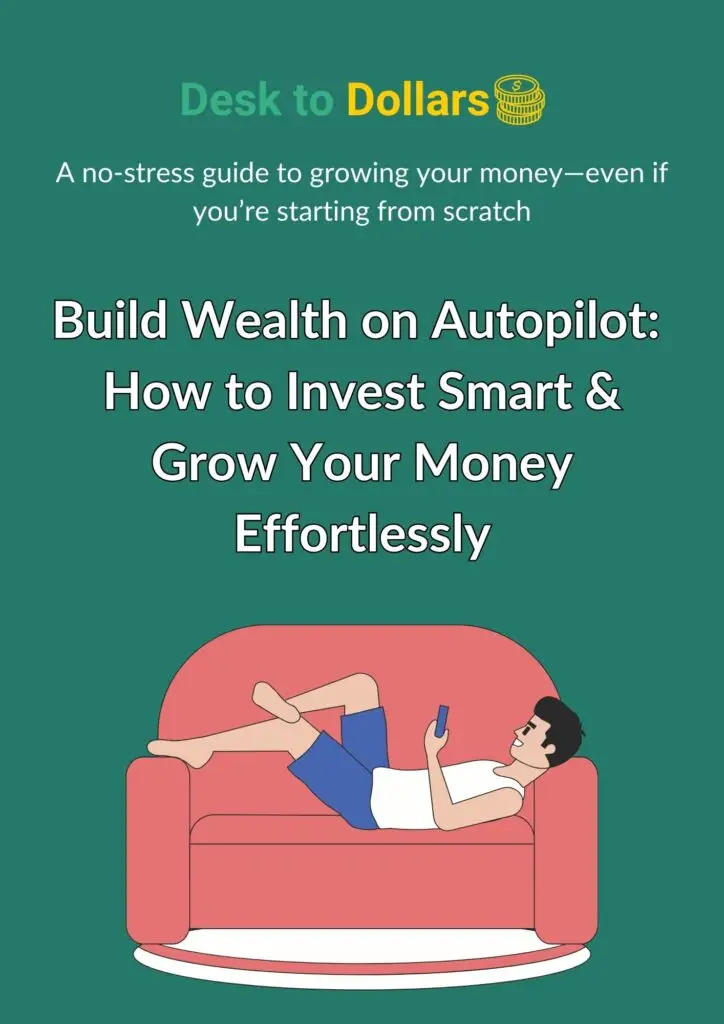Most people in their 30s think wealth-building is about earning more money. Wrong. If that were true, every high earner would be rich. But look around—there are people making six figures who are still broke, living paycheck to paycheck.
Wealth isn’t just about how much you earn—it’s about how much you keep and multiply. The good news? Even if you’ve made zero financial progress until now, your 30s are the best time to turn things around. You still have time to build serious wealth, but only if you stop making the same mistakes that keep most people stuck.
If you want to be financially free in your 40s and beyond, here’s how to actually build wealth—without just hoping for a lucky break.
1. Stop playing defence—Start playing offence
Most people approach money defensively—saving a little here and there, trying to “cut expenses” and “budget better.” While controlling your spending is important, you can’t shrink your way to wealth.
How to do it:
- Focus on income growth first. If you’re making $40k, saving 10% is only $4k a year. If you’re making $80k, 10% is $8k. The easiest way to save more is to earn more.
- Build high-income skills. If your job pays you the same as it did five years ago, you’re in trouble. Learn skills that boost your earning power—negotiation, sales, leadership, or tech-based skills.
- Make money work for you. Your job should be the first step, not the only step. Investing, side businesses, and asset ownership are what separate the rich from everyone else.
💡 Wealthy people focus on growing the pie, not just cutting slices.

2. Master the 3 levels of money
Most people only focus on one level of money—earning. That’s why they stay stuck. Real wealth-builders master all three:
1️⃣ Making money – Your salary, side hustles, or business.
2️⃣ Multiplying money – Investing in assets that grow in value.
3️⃣ Protecting money – Keeping your wealth safe from bad decisions, taxes, and inflation.
How to do it:
- Increase your income. Ask for a raise, switch jobs, start freelancing—whatever it takes.
- Start investing early (even if it’s small). The goal is ownership—stocks, index funds, rental properties, or even starting a business.
- Avoid wealth killers. High-interest debt, impulsive purchases, and lifestyle inflation destroy your financial future. If you owe credit cards, always make sure to repay your credit card bills in full every month.
🔥 Making money is the first step. Keeping and growing it is what makes you rich.
3. Your salary won’t make you wealthy, but this will
If a high salary made you rich, every doctor and lawyer would be a millionaire. But they’re not—because income alone doesn’t build wealth.
What actually makes you rich? Assets.
How to do it:
- Buy assets, not liabilities. Every dollar you make should either buy freedom or stuff. Choose freedom.
- Invest in things that pay you. Stocks, rental properties, businesses, or anything that puts money in your pocket.
- Stop relying on just one income stream. Wealthy people don’t depend on a single salary—they have multiple sources of income. Rental, investing, or passive income – all of these generate more money.
💰 Your salary is a tool, not the goal. Use it to buy your freedom.
💡 Assets vs liabilities
Every dollar you earn should either buy freedom or stuff—prioritise freedom. Assets (stocks, property, businesses) put money in your pocket. Liabilities (cars, gadgets, luxury items) take money out. The rich prioritise ownership over consumption. Before every purchase, ask: Will this make me richer or poorer? 🚀
4. The hidden wealth killer: lifestyle creep
Ever notice how every time you earn more, you spend more? That’s lifestyle creep, and it’s why most people stay broke no matter how much they make.
- Got a raise? Time for a new car.
- Earned a bonus? Holiday upgrade.
- Got promoted? Time to move into a bigger house.
Before you know it, you’re making double what you were five years ago, but somehow, you still have no savings.
How to avoid it:
- Set a “Rich Ratio.” Decide what % of every income increase will go to investing vs. spending. Example: 50% goes into wealth-building, 30% into fun, 20% into savings.
- Live below your means—no matter what you earn. If your income doubles, your lifestyle shouldn’t.
- Understand that true wealth is freedom, not possessions. Fancy cars and watches don’t make you rich—having time and choice does.
💡 Wealthy people invest income increments. Broke people spend them.
5. Your 30s are your prime time for investing
A lot of people say, “I’ll start investing when I earn more.” The problem? Waiting is the most expensive mistake you can make.
Here’s why:
Let’s say you invest $300 a month starting at age 30. With an 8% return, by 60, you’ll have $450,000+.
But if you wait until age 40 to start? You’ll have just $200,000.
Waiting 10 years costs you $250,000.
How to start investing today:
- If you have $0, start with index funds. They’re simple, low-cost, and outperform most investors. Here’s the one suggestion you should consider: Vanguard S&P 500 ETF (VOO).
- If you have extra cash, diversify. Real estate, stocks, or even your own business can be great wealth-builders.
- Automate it. Set up an automatic monthly transfer into your investment accounts so you don’t have to think about it.
🔥 The best time to invest was 10 years ago. The second-best time is now.
💡Why Vanguard S&P 500 ETF (VOO)?
As its name suggests, the Vanguard S&P 500 tracks the S&P 500 index, and it’s one of the largest funds on the market with hundreds of billions in the fund. The S&P 500 consists of the 500 largest companies in the US, including Apple, Microsoft, Bank of America, and Boeing, to name a few.
Expense ratio: 0.03%. That means every $1,000 invested would cost you only $0.3 annually.
5-year annualised return: 14.48%
Who is it good for?: Ideal for investors seeking a low-cost, broadly diversified index fund as a core component of their portfolio.

6. Never rely on just one source of income
In the corporate world, one income stream is a dangerous game.
🚨 If your job disappears, so does your entire income.
How to build multiple income streams:
- Start a side hustle. Something simple—consulting, freelancing, or an online business.
- Build passive income. Rental properties, dividend stocks, or digital products that make money while you sleep. Ignore the fact that dividend stocks may pay you small amounts at first; the more you invest, the higher the dividend payouts will be.
- Create assets that pay you. Write a book, launch an online course, or invest in businesses.
💡 One income source = financial risk. Multiple income sources = financial security.
7. The secret to staying rich: protect your wealth
Making money is one thing. Keeping it is another. Plenty of people make millions and lose it all because they don’t know how to protect their wealth.
How to keep your wealth safe:
- Have a financial buffer. A 6-month emergency fund stops you from making desperate decisions.
- Avoid dumb investments. If something promises quick, guaranteed returns, it’s a scam.
- Insure what matters. Health, income, and assets—don’t let one crisis wipe out years of progress.
🔥 Getting rich is the start. Staying rich is the real challenge.

Build Wealth on Autopilot: How to Invest Smart & Grow Your Money Effortlessly
🚀 Build Wealth on Autopilot is the no-stress investing guide for busy professionals who want to grow their money without wasting hours on research, complicated strategies, or financial jargon.
Get your copy! 👉
Final thoughts: Make your 30s count
Your 30s are your golden decade. If you build wealth the right way now, you’ll thank yourself in your 40s and 50s.
Here’s the simple formula:
✔ Increase your income (skills, career growth, side hustles)
✔ Invest early and often (stocks, property, assets)
✔ Avoid lifestyle creep (spend with purpose, not impulse)
✔ Build multiple income streams (never rely on just one job)
✔ Protect your wealth (no risky bets, have a safety net)
Most people waste their 30s making financial mistakes they regret later. Don’t be most people.
Start now. Your future self will thank you. 🚀



